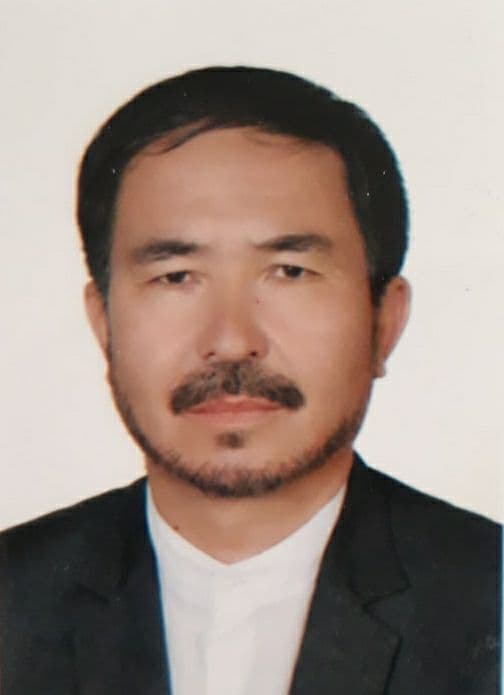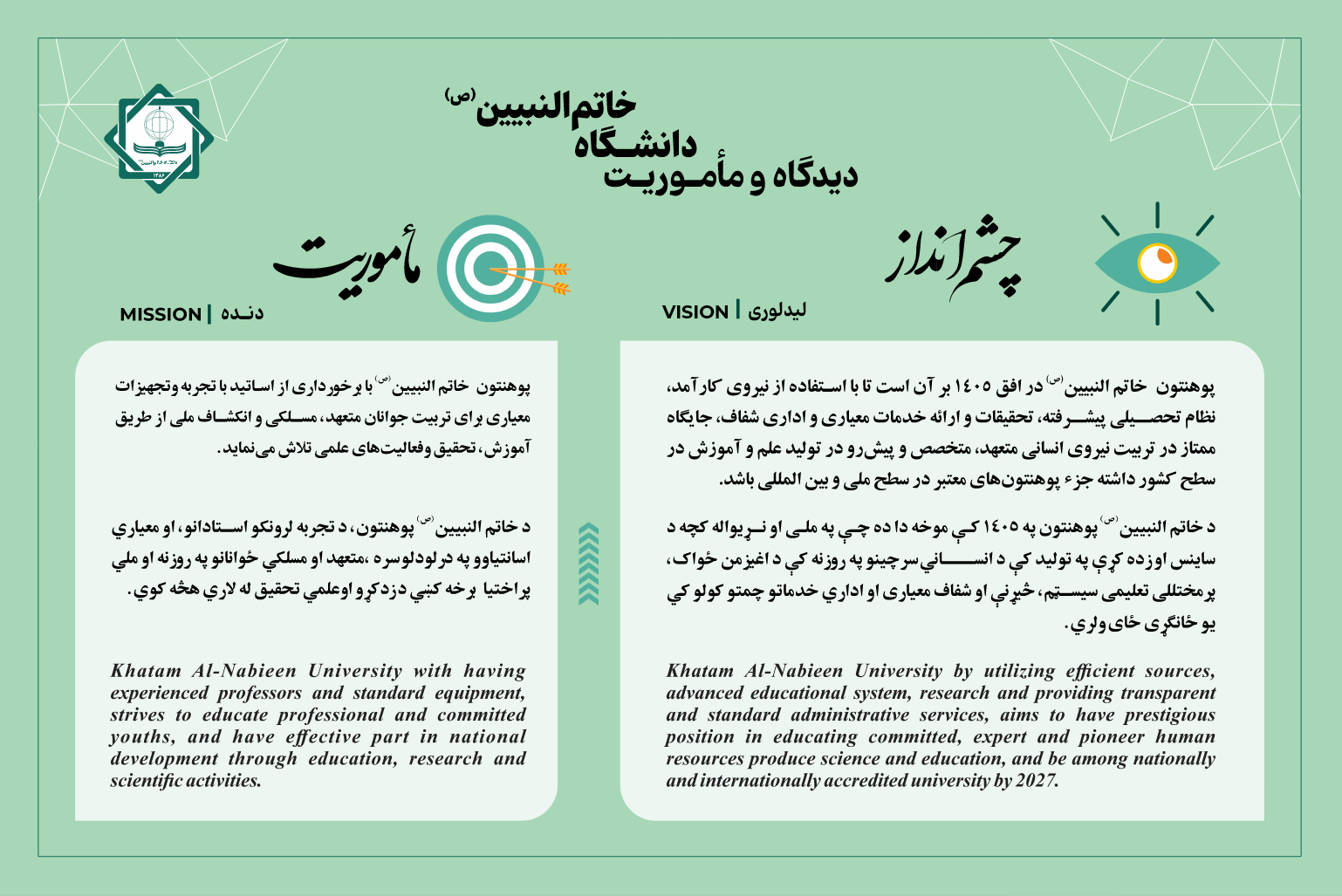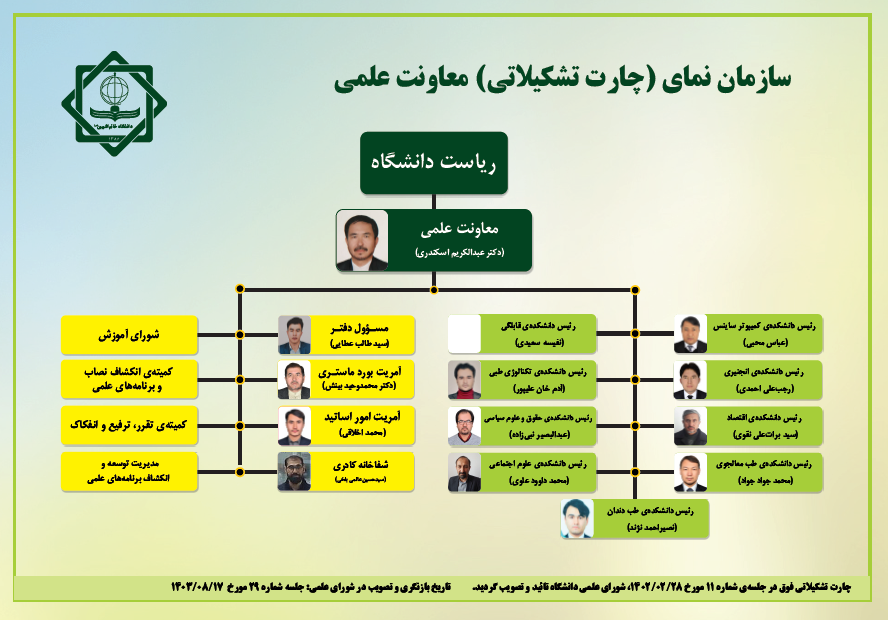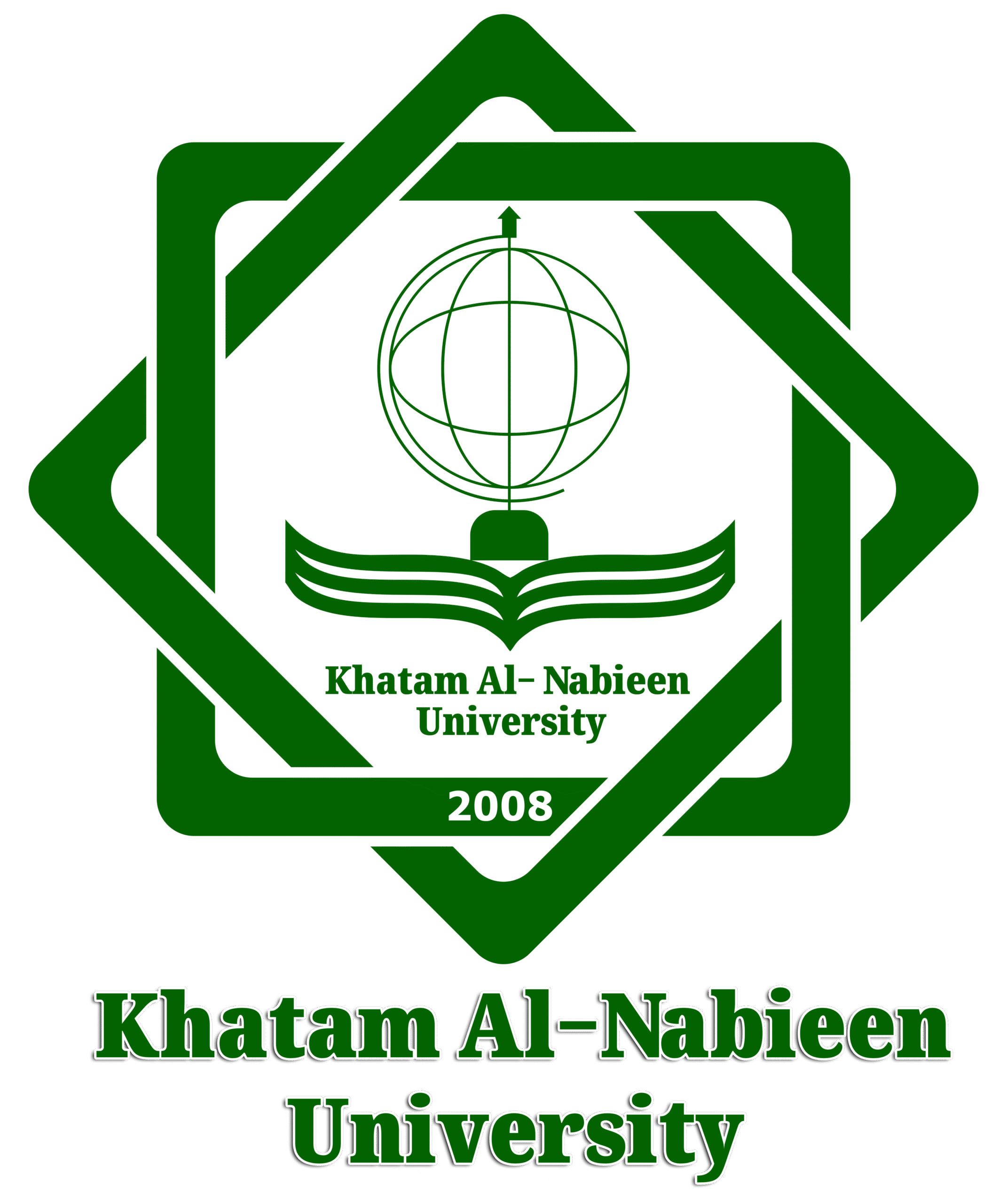Academic Vice-President

Dr. Abdul Karim Skandari, born in 1970 in Ghazni Province, holds a Ph.D. in Criminal Law and Criminology from the University of Tehran. Dr. Skandari has been a faculty member of the Faculty of Jurisprudence and Law since 2009 and has previously served in various university positions, including Cultural Affairs Officer, Research Officer, Head of the Department of Criminal Law and Criminology, and Dean of the Faculty of Jurisprudence and Law. Since 2021, he has been serving as the Scientific Vice-Chancellor. Dr. Skandari has authored several valuable works, including “The Legal Status of Female Victims in Jurisprudence and Law”, “Criminological Analysis of the Effects of Criminal Convictions and Their Solutions”, the textbook “International Criminal Law”, and numerous scientific articles published in reputable national and international journals and websites.
Dr. Abdul Karim Skandari
Educational Background:
- Bachelor’s Degree in Islamic Studies and Law, Imam Khomeini Educational and Research Institute, Year of Enrollment: 2001, Year of Graduation: 2005;
- Master’s Degree in Criminal Law and Criminology, Imam Khomeini Educational and Research Institute, Year of Enrollment: 2006, Year of Graduation: 2008;
- Level Four Graduate of Al-Mustafa International University, 2004;
- Ph.D. in Criminal Law and Criminology, University of Tehran. Thesis Title: “Criminological Analysis of the Effects of Criminal Convictions”, Defense Year: 2017.
Academic and Executive Activities:
- Director of Educational and Cultural Affairs, Khatam Al-Nabieen University, Kabul, 2009–2010;
- Head of the Scientific Research Department, Khatam Al-Nabieen University, Kabul, 2010–2011;
- Dean of the Faculty of Law, Khatam Al-Nabieen University, Kabul, 2011–2013;
- Editor-in-Chief of the Weekly “Student”, Khatam Al-Nabieen Higher Education Institute, Afghanistan, 2009–2011;
- Editor-in-Chief of the Quarterly “Ruyesh”, Khatam Al-Nabieen University, Afghanistan, 2010–2011;
- Member of the Scientific Board of the Quarterly “Legal Studies of Afghanistan”;
- Member of the Scientific Board of the Quarterly “New Discourse”, Center for Strategic Studies and Research of Afghanistan;
- Member of the Editorial Board of the Scientific-Research Quarterly “Balagh”;
- Member of the Editorial Board of the Quarterly “Legal Knowledge”, Khatam Al-Nabieen University, Kabul;
- Scientific Vice-Chancellor of Khatam Al-Nabieen University, 2021–Present.
Scientific Articles:
- The Position of International Custom in Islam, “Balagh” Cultural-Intellectual Journal, 2005;
- A World Parliament within the United Nations, “Balagh”;
- Methods of Acquiring Citizenship in the Islamic System, “Andisheh Farda”, 2005;
- A Look at the Rights of Men and Women from an Islamic Perspective, “Legal Studies”, Center for Legal Studies of Afghanistan, Issue 5;
- The Position of Freedom of Expression in Islam and the West, “Legal Studies”, Center for Legal Studies of Afghanistan, Issue 1;
- Relatives’ Liability in Intentional and Quasi-Intentional Homicide, “Legal Studies”, Issue 6;
- An Analysis of Citizenship from the Perspective of Islam and Afghan Citizenship Law, “Legal Studies”, Issue 7;
- The Role of Repentance in Removing Criminal Liability, “Legal Studies”, Issues 3 and 4;
- The Impact of Harmful Customs on Women’s Rights in Afghanistan and Solutions, “New Discourse”, Issues 21 and 22;
- The Position of International Custom in Islam, “Balagh” Quarterly;
- Solutions for Protecting Victims in Islamic Criminal Policy and International Documents, “Ma’rifat”, Issue 134, Imam Khomeini Educational and Research Institute;
- The Rights of Female Victims and Their Criminal Protection in Afghan Laws, “Legal Studies”, Issues 11 and 12;
- A Jurisprudential-Legal Analysis of the Role of Guardian’s Consent in Marriage, “Balagh”;
- Islamic Strategic Principles on the Differences in Men’s and Women’s Rights, “Balagh” Quarterly;
- Methods of Crime Prevention from the Perspective of the Holy Quran, “New Discourse” Quarterly, Issues 22 and 23;
- Pathology of Religious Intellectualism in Afghanistan, “New Discourse” Quarterly, Issues 20 and 21;
- The Origin of Gender Differences in the Islamic Legal System, Conference Proceedings on Women;
- Victimization of Women in Afghanistan: Roots and Solutions, Ibid.;
- The Philosophy of Punishment for Apostasy, “Balagh” Scientific-Research Quarterly;
- Solutions for Protecting Crime Victims in Afghan Laws and International Documents, “Adalat” Journal, Ministry of Justice of the Islamic Republic of Afghanistan, Serial No. 94, 2010;
- Who is an Apostate and What is the Philosophy of Their Punishment?, “Adalat” Journal, Ministry of Justice of the Islamic Republic of Afghanistan, Serial No. 98, 2011;
- The Right to Silence of the Accused in Afghan Laws and International Documents, “Balagh” Scientific-Research Quarterly (2012);
- The Use of Situational Rulings in Situational Prevention, “Balagh” Scientific-Research Quarterly (2013);
- The Role of Omission in the Material Element of Homicide from the Perspective of Afghan Criminal Law and International Documents, “Puyesh” Scientific-Specialized Quarterly, Khatam al-Nabieen University, Kabul (2013);
- Necessity as a Justifying Factor or a Ground for Exemption from Criminal Liability, “Balagh” Scientific-Research Quarterly (2014);
- The Rights of Minorities in the Islamic System, “Kowsar” Scientific Quarterly, 2013;
- An Analysis of Quasi-Judicial Institutions in Afghanistan, “Balagh” Scientific-Research Quarterly;
- The Rights of Female Victims in International Documents and Reasons for Their Non-Implementation, “Puyesh” Scientific-Specialized Quarterly, Khatam al-Nabieen University, Kabul (2014);
- The Criminal Policy of the Islamic Republic of Afghanistan on Economic Crimes, “Andisheh Khatam”, Khatam al-Nabieen University, Ghazni Branch, 2015;
- Manifestations of Restorative Justice in the Islamic Republic of Afghanistan, “Puyesh” Scientific-Specialized Quarterly, Khatam al-Nabieen University, Kabul, 2015;
- Extradition of Criminals and Its Implementation with Emphasis on Afghan Extradition Law, “Khatam al-Nabieen” Scientific-Research Quarterly, Year 1, Issue 2, Winter 2016;
- Challenges and Solutions of Complementary Punishment with Emphasis on Afghan Criminal Law, “Khatam al-Nabieen” Scientific-Research Quarterly, Year 2, Issue 3, Spring 2017;
- The Effects of Criminal Convictions and Their Foundations, “Khatam al-Nabieen” Scientific-Research Quarterly;
- The Position of Victims in Afghan Criminal Laws, “Bonyad Andisheh” Scientific-Specialized Journal, Year 1, Issue 3, Spring 2016;
- Criminal Immunity of Members of the National Assembly in Afghan Law, “Bonyad Andisheh”, Year 4, Issue 13, Fall 2018;
- Intentional Abortion from the Perspective of Ayatollah Mohseni, “Khatam al-Nabieen” Scientific-Research Quarterly, 2022;
- The Responsibility of Physicians from the Perspective of Ayatollah Mohseni, “Khatam al-Nabieen” Scientific-Research Quarterly, 2023;
- Crimes of Violating Civil Aviation Regulations in Afghan Criminal Laws, “Legal Knowledge” Scientific-Research Quarterly, 2023, Volume 1, Issue 2;
- An Analysis of Fines in Afghan Criminal Law, “Legal Knowledge” Scientific-Research Quarterly, Year 1, Issue 1, Fall 2023;
- Jurisprudential-Legal Solutions to Guarantee the Right to Peaceful Life in Afghanistan, Indexed in the Islamic World Citation Database;
- The Role of Rehabilitation in Crime Prevention, International Journal of Multicultural and Multireligious Understanding, 2024;
- Afghanistan’s Criminal Policy on Economic Crimes, International Journal of Multicultural and Multireligious Understanding, 2024.
Books:
- The Legal Status of Female Victims in Jurisprudence and Law, Publications of Imam Khomeini Educational and Research Institute, 2012;
- Criminological Analysis of the Effects of Criminal Convictions and Their Solutions, Khatam al-Nabieen University, Kabul, 2022;
- International Criminal Law, Publications of Khatam al-Nabieen University, Kabul, 2024;
- Collaboration in the Compilation of the Book “The Legal Personality of Women”, Qom, Ma’arif Publications;
- Collaboration in the Compilation of the Book “Family Rights of Women”, Qom, Ma’arif Publications.
About the Scientific Vice-Chancellorship:
According to the regulations of higher education in Afghanistan, the Scientific Vice-Chancellorship is one of the key pillars of universities and is responsible for all academic and educational affairs. Since the establishment of the university in 2008, the Scientific Vice-Chancellorship, along with its subordinate units, has been responsible for planning and initiating scientific research, conferences, and updating educational systems to enhance the academic level. It oversees the academic affairs of faculties and the implementation of curricula to improve educational quality, aiming to produce committed and specialized individuals and generate knowledge. Developing advanced educational programs and utilizing modern scientific methods to elevate higher education based on national and international standards, as well as ensuring the proper and timely implementation of educational programs, are among the primary responsibilities of the Scientific Vice-Chancellorship.
The Scientific Vice-Chancellorship adheres to principles and values such as preserving religious teachings, ethics, and human dignity; protecting and developing human capital; scientific focus; quality orientation and academic competence; student-centeredness; environmental protection; and combating administrative corruption, provided they do not conflict with human, Islamic, and national values.
Academic-Educational Units
Faculties and Fields
Currently, Khatam al-Nabieen University has 10 faculties: Jurisprudence and Law, Political Science, Economics, Social Sciences, Computer Science, Engineering, Midwifery, Medical Technology, Dentistry, and General Medicine. Additionally, the university offers 18 programs at various academic levels, including 3 master’s programs, 2 MD programs, 2 DMD programs, and 11 bachelor’s programs.
Faculty of Law and Political Science | |
Bachelor’s | Master’s |
Public Law | Criminal Law and Criminology |
International Law | |
Political Science | International Relations |
Faculty of Economics | Faculty of Social Sciences |
Bachelor’s | Bachelor’s |
Commercial Economics | University General Courses |
Business Management | Quranic Sciences |
Faculty of Computer Science | Faculty of Engineering |
Bachelor’s | Bachelor’s |
Software Engineering | Civil Engineering |
Information Technology | Electrical Engineering |
Faculty of Medical Technology | Faculty of Midwifery |
Bachelor’s | Bachelor’s |
Chemistry and Biochemistry | Pregnancy and Mixed Care |
Biology and Microbiology | Health and Pregnancy |
Faculty of Dentistry (Stomatology) | Faculty of General Medicine |
DMD | MD |
Prosthodontics | Public Health and Pharmacology |
Anatomy and Physiology | Internal Medicine |
Vision and Mission of the Academic Vice-President

Organizational Chart of the Academoc Vice-President

Faculties and Departments
| No | Faculties | Relevant Page Links |
|---|---|---|
| 1 | Faculty of General Medicine | Click! |
| 2 | Faculty of Dentistry (Stomatology) | Click! |
| 3 | Faculty of Medical Technology | Click! |
| 5 | Faculty of Midwifery | Click! |
| 5 | Faculty of Law and Political Science | Click! |
| 6 | Faculty of Economics | Click! |
| 7 | Faculty of Computer Science | Click! |
| 8 | Faculty of Engineering | Click! |
| 9 | Faculty of Social Sciences | Click! |
Councils and Committees
The University’s Academic Council consists of the following:
- Master’s Programs Board Council;
- Academic Managers Council;
- Curriculum and Academic Programs Development Committee;
- Appointment, Promotion, and Dismissal Committee.
Administrative Units
Directorates
- Master’s Board Directorate
Master’s Programs Board Directorate: Khatam Al-Nabieen University hosts three master’s programs: “International Law”, “International Relations”, and “Criminal Law and Criminology”. The management and leadership of these programs are under the supervision of Dr. Mohammad Wahid Binesh, a faculty member of the Faculty of Political Science. Dr. Binesh holds a Ph.D. in Political Science and has provided valuable services to the academic community, including teaching at bachelor’s and master’s levels and authoring several books and scientific articles at national and international levels.
Dr. Binesh has previously served as the University President, Scientific Vice-Chancellor, Head of Research, and Dean of the Faculty of Political Science. Currently, he is the Director of the Master’s Board at Khatam Al-Nabieen University. Some of Dr. Binesh’s most notable activities include:
-
- Publishing textbooks for professors;
- Publishing scientific-research journals of the university in three fields: humanities, technical sciences, and medical sciences;
- Publishing student journals for the three master’s programs (Criminal Law and Criminology, International Law, and International Relations);
- Obtaining international standard numbers for scientific-research journals;
- Organizing scientific seminars and research workshops.
Supervising the educational and research programs of master’s students is one of the main responsibilities of the Board Directorate.
- Professors Affairs Directorate
Mr. Mohammad Akhlaqi holds a master’s degree in Criminal Law and Criminology and has been serving as the Director of Faculty Affairs since 2012. The Faculty Affairs Directorate is one of the most important subunits of the university and the Academic Vice-President, operating directly under the supervision of the Scientific Vice-Chancellorship and in accordance with its mandate. This directorate is responsible for all matters related to academic and contractual faculty members and serves as the communication bridge between faculty members and the Academic and administrative-financial vice-President.
In addition to his role as the Director of Professors Affairs, Mr. Akhlaqi serves as the secretary of the University Academic Council and the meetings of the academic managers under the Vice-President, as well as the head of the Curriculum and Promotion Committees.
Managements
- Development and Academic Programs Management
Ruhullah Naimi is the acting head of the Development and Academic Programs Management. Key responsibilities include following up on curricula with the Ministry of Higher Education, coordinating the development and revision of syllabi for existing and new programs, and overseeing the licensing process. Mr. Naimi also serves as the Director of Communications and Information at the university.
- Office Manager of the Academic Vice-Preident
Sayed Talib Ataei, the Office Manager of the Academic Vice-President, holds a bachelor’s degree in Civil Engineering and is currently pursuing a degree in Environmental Civil Engineering. Mr. Ataei has worked for over three years as the Manager of the Master’s Programs Board at this university. His main responsibilities include preparing annual plans for the Academic Vice-President, coordinating with faculties and executive units, organizing meetings for the Academic Vice-President, and consolidating quarterly and annual reports of the Vice-President.
Facilities and Spaces
- Animal Laboratory: Khatam Al-Nabieen University activated the first animal laboratory in Afghanistan, where several students conducted research, and their studies were published in reputable international journals.
- Library: The university library holds a total of 17,229 books for the faculties, including 3,820 miscellaneous volumes. Of these, 4,008 belong to the Faculty of Law and Political Science, 5,117 to the Faculty of Economics and Social Sciences, 864 to the Faculty of Computer Science and Engineering, 1,220 to the Faculty of Midwifery and Medical Technology, 496 to the Faculty of Dentistry, and 5,524 to the Faculty of General Medicine.
- University Management Information System (MIS): This system is equipped for conducting online classes, uploading course materials and resources, recording student attendance, and registering course policies and grades.
- High-Speed Internet: High-speed internet is available in all offices, net clubs, and the university library.
- Publications: Providing necessary books for students and researchers across the country.
- Green Spaces: The university currently boasts the best, vibrant, and peaceful green spaces for students.
- Laboratories: Students’ scientific work is conducted using updated laboratories.
Academic Policies and Regulations
| Regulations, Policies, and Educational Procedures of Khatam Al-Nabieen (PBUH) University | |||
|---|---|---|---|
| No | File Title | File Type | Download File |
| 1 | Academic Freedom Policy | Click Here! | |
| 2 | Complaint Handling Procedure | Click Here! | |
| 3 | Ethical Principles for Faculty Members | Click Here! | |
| 4 | Faculty Code of Ethics | Click Here! | |
| 5 | Policy for Selection and Recruitment of Non-Academic Staff (Contractual) | Click Here! | |
| 6 | Procedure for Recruitment and Appointment of Academic Staff | Click Here! | |
Features and Key Achievements
Features
- Experienced Faculty Members: One of the unique features of Khatam Al-Nabieen (PBUH) University is its highly experienced and skilled faculty members, who are graduates of prestigious universities both domestically and internationally. Currently, the university has 79 academic staff members with degrees in medical, technical, and humanities fields, including Ph.D., Ph.D. candidates, master’s, specialists, and MD holders.
- University Location: The university is conveniently located on Darul Aman Road, easily accessible to faculty and students. It boasts well-equipped and standardized classrooms and laboratories for research.
- Diverse Programs: The university offers a variety of programs in three main fields: humanities, medical sciences, and technical sciences.
- Academic Accreditation: The university has successfully completed the third stage of academic accreditation.
Key Achievements
- Appointment of academic faculty members in accordance with the Ministry of Higher Education’s policies;
- Development of the Scientific Vice-Chancellorship’s strategic plan;
- Systematization of the monitoring and evaluation process for subordinate units;
- Highest number of academic faculty members with Ph.D. and Ph.D. candidate qualifications;
- Stabilization and promotion of academic ranks for faculty members;
- Organization of scientific seminars and educational workshops;
- Development and revision of educational and research policies and regulations;
- Development and revision of bachelor’s and master’s program curricula;
- Compilation of textbooks and reference materials;
- Efforts to establish new programs at bachelor’s and master’s levels.
Qualifications and Responsibilities of the Academic Vice-President
- Proposing and developing developmental and executive programs in the field of academic and research affairs;
- Providing assistance and advice to the University President and Vice-President for the continuous improvement of university activities;
- Proposing and developing policies, regulations, and executive procedures in the field of academic and research affairs to the presidency and the supreme council;
- Leading and advancing academic and research affairs;
- Executing necessary actions regarding the appointment, promotion, and dismissal of academic staff members;
- Evaluating and updating the curriculum in accordance with contemporary needs through relevant authorities;
- Supervising the implementation of the curriculum;
- Developing and expanding academic programs;
- Monitoring the preparation of annual supervision reports and periodic reviews of academic programs;
- Preparing and submitting detailed reports to the Ministry of Higher Education, Planning and supervising capacity-building programs for faculty members;
- Chairing the academic council and special committees established as needed;
- Monitoring and evaluating the performance of faculties;
- Supervising the distribution of courses and class scheduling;
- Reviewing, approving, and submitting monthly performance reports of faculty members to the university president;
- Monitoring and evaluating the activities of administrative and executive staff under the scientific vice-chancellorship;
- Performing the duties of the university president in their absence;
- Reporting on their activities to the university president and the supreme council;
- Performing other duties legally assigned to the scientific vice-chancellor based on specific requirements;
- Participating in necessary external meetings.
Key Responsibilities of the Academic Vice-President
- Participating in necessary external meetings.
- Proposing and developing policies, regulations, and executive procedures in the field of academic and research affairs;
- Leading and advancing academic and research affairs;
- Executing necessary actions regarding the appointment, promotion, and dismissal of academic staff members;
- Evaluating and updating the curriculum in accordance with contemporary needs through relevant authorities;
- Supervising the implementation of the curriculum by branches and faculties;
- Developing and expanding academic programs;
- Planning and supervising capacity-building programs for faculty members;
- Supervising the distribution of courses and class scheduling;
- Monitoring and evaluating the activities of administrative and executive staff under the Academic Vice-President;
- Performing the duties of the university president in their absence;

